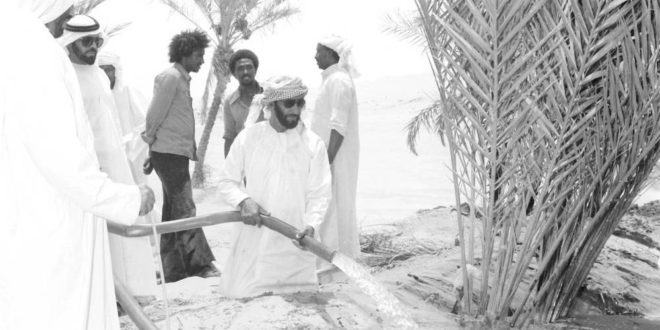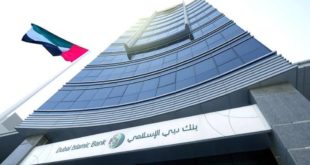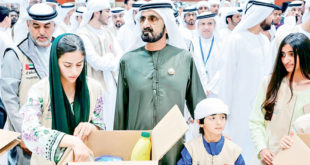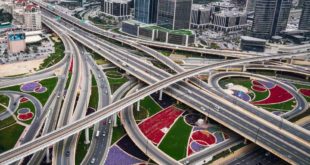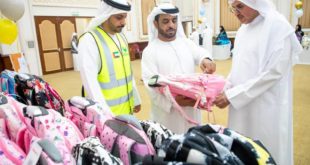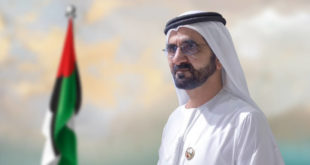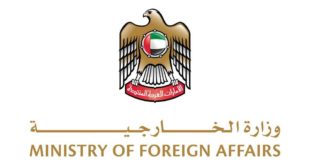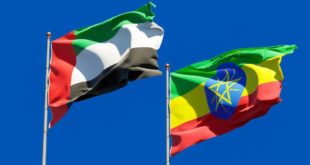Values and practices related to the sustainability of the environment and the preservation of wildlife and biodiversity are an integral part of the Emirati heritage, which occupied a large space in the thought of the late Sheikh Zayed bin Sultan Al Nahyan, may God rest his soul. Where his saying: “He who has no past.
The late Sheikh Zayed made great efforts to preserve biodiversity and enhance environmental resources by working to sustain living creatures associated with traditional sports, whether falcons, camels or horses. As his efforts, may God rest his soul, resulted in programs and initiatives that achieved many achievements, which contributed to increasing interest in the breeding and protection of falcons, developing purebred Arabian camel breeds, giving them special attention to preserve them, launching a program for breeding purebred Arabian horses, and encouraging the people of the country to breed And the acquisition of the best horses.
The theme of the “founding father’s legacy” is highlighted within the “National Sustainability” campaign that was recently launched, coinciding with the preparations for the Conference of the Parties to the United Nations Framework Convention on Climate Change (COP28), which will be held from November 30 to December 12. The first of this year in Dubai Expo City, the approach and legacy of the late Sheikh Zayed bin Sultan Al Nahyan, may God rest his soul, in the field of sustainability.
The campaign aims to raise awareness about environmental sustainability issues, encourage community participation, and support national strategies related to climate action, in order to achieve a positive impact on the behavior and responsibilities of individuals, leading to an environmentally conscious society, which is in line with the vision of the late Sheikh Zayed bin Sultan Al Nahyan. Well, God bless him.
The UAE’s hosting of “COP28” constitutes a global opportunity in which the world learns about the UAE’s initiatives in protecting nature and the great imprints in this field, as expressed by the founding father, may God rest his soul in peace, by saying: “We take from our environment as much as we need, and leave in it what you find in it.” Future generations are a source of goodness and a source of giving.” The UAE has taken this saying as a reference and method, and translated it into policies, strategies and legislation aimed at achieving biodiversity and promoting the desired balance between growth, preserving the environment and the sustainability of its natural resources.
primary axis
The interest of the late Sheikh Zayed bin Sultan Al Nahyan, may God rest his soul, since an early stage in the life of the state in the Emirati heritage, is due to his belief that it is an essential axis of the comprehensive and sustainable development process, and a major component of the civilized components of the Emirates. Where he saw, may God rest his soul, that the progress of nations and peoples is not only measured by their renaissance in the economic fields and infrastructure only; Rather, it is the extent to which it preserves its history and heritage, as an essential part of the national wealth, and one of the most important pillars of its soft power at the international level.
The late Sheikh Zayed bin Sultan Al Nahyan, may God rest his soul, stemmed from his interest in consolidating the sustainability of heritage from his belief in the importance of integration between the three pillars of sustainable development, economic, social and environmental, as well as in consolidating international peace and security. as two basic requirements for sustainable development.
In 1966, when the late Sheikh Zayed became ruler of the Emirate of Abu Dhabi, which began its rapid rise as an oil producer, he established an animal welfare authority that included a group of observers who took over the protection of wild areas, to supervise the implementation of the ban on hunting animals.
A heritage landmark
The association of the late Sheikh Zayed, may God rest his soul in peace, with the life of the desert had a great impact on his approach to spreading the heritage. In this context, the founding father, may God rest his soul in peace, paid great attention to camels, as they are part of the country’s heritage, and camel racing has become a heritage and cultural event. It is important in the UAE, and the most popular in the country, and it provided the owners and breeders of camels with annual support, to enable them to continue to preserve them, which enabled them to occupy a distinguished position among the heritage sports. This was reflected in the status of the Emirates, which during his reign, may God rest his soul, occupied an advanced position in maintaining the balance between originality and modernity.
The interest of the late Sheikh Zayed, may God rest his soul, in camels reflects his vision of working to preserve the cultural and natural heritage. Therefore, his efforts focused on developing purebred Arabian camel breeds, and giving them special attention. Where he, may God rest his soul, ordered the establishment of an advanced scientific laboratory equipped with the latest technologies and scientific methods in genetic engineering in the city of Al Ain. with the aim of doing this task.
Nature champion
The efforts of the late Sheikh Zayed bin Sultan Al Nahyan, may God rest his soul, continued to preserve nature and protect the types of wildlife. The Sheikh Zayed Falcon Release Program contributed to preserving the natural balance of falcons and reviving the sport of falconry through sustainable global best practices, with the aim of protecting biodiversity, preserving important species in human heritage, and mitigating the impact of the risks it faces.
The late Sheikh Zayed was a source of inspiration and sponsorship for many initiatives that bore fruit, and contributed a great deal of giving at the national, regional and global levels. One of his most important initiatives in this field was the organization of the first World Conference on Falconry and Nature Conservation in Abu Dhabi in 1976.
In 1995, the late Sheikh Zayed worked to switch from the use of wild falcons to falcons bred in captivity, and by 2002 the UAE had become the first Arab country to rely on the use of falcons bred in captivity in the sport of falconry.
The founding father has pioneering efforts in the world of falconry, as he is the first pioneer of falconers and environmentalists in the world
 Media ININ Economy We Trust
Media ININ Economy We Trust

